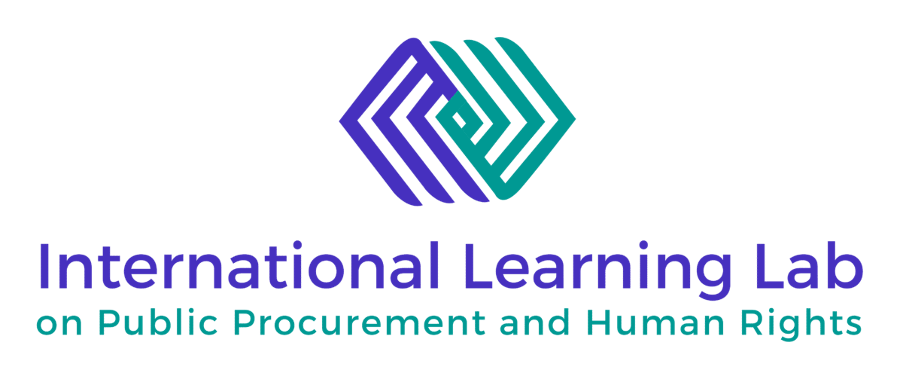THE FUTURE OF SUSTAINABLE PROCUREMENT IN UK PUBLIC PROCUREMENT REGULATION: AN ANALYSIS OF THE GREEN PAPER ON TRANSFORMING PUBLIC PROCUREMENT - Miriam Mbah, May 2021
The use of public procurement to promote the three pillars of sustainable development (social, environmental and economic) have long been recognised by international organisations and implemented in international public procurement instruments such as the WTO Government Procurement Agreement, World Bank Procurement Regulations, UNCITRAL Model Law on Public Procurement and the European Union (EU) procurement Directives (Directive 2014/24/EU, Directive 2014/23/EU and Directive 2014/25/EU). These international procurement instruments have lead the way (albeit limited) for countries, including the United Kingdom (UK), to put sustainability at the forefront of their public procurement regulation.
On a national level, governments have used their purchasing power to promote national policies and leverage change in their suppliers’ operations and practices (see discussions). These are enshrined in their public procurement legislation. For example, the UK primary public procurement frameworks (the Public Contracts Regulations 2015 (PCR), the Utilities Contracts Regulations 2016, the Concession Contracts Regulations 2016 and the Defence and Security Public Contracts Regulations 2011), which has its origin from the EU procurement Directives contains several provisions that promote sustainability. These are discussed below.
With the end of the Brexit transition period on the horizon, the UK government were keen to “transform” their procurement frameworks by departing from the EU approach to procurement regulation. This led to the publication of the UK public procurement Green Paper in December 2020. In respects to sustainability, the Green Paper was a momentous opportunity for the UK to show progress and leadership in its sustainable practices, especially in view of the UN Sustainable Development Goal.
The extent to which the UK has shown transformation, progression or leadership in the context of sustainability is the focus of this piece. Progression or transformation in this aspect focuses on whether the Green Paper introduces new sustainable provisions that are innovative, improves the efficiency or effectiveness of current sustainable provisions or indicates changes that will take place in future amendment of the public procurement frameworks. These benchmarks are applied against three sustainability Green Paper proposals.
SUSTAINABLE PROCUREMENT IN THE UK PUBLIC CONTRACTS REGULATIONS: AN OLD TALE
Sustainable procurement is not a new feature introduced by the Green Paper as provisions in the current PCR encourage contracting authorities to apply processes that would promote the Government’s social, environmental and economic agenda. For example, Regulation 57 enables contracting authorities to tackle serious crimes committed by economic operators (suppliers). Where economic operators have been convicted of crimes such as corruption, bribery, fraud, money laundering, sexual offences, immigration offences and modern slavery, they must be subjected to Regulation 57 mandatory exclusion.
Regulation 58(9) is another significant provision that promotes the economic pillar of sustainable development. The Regulation encourages SMEs participation by restricting contracting authorities (public entities) from requiring annual turnovers that “exceed twice the estimated contract value” from economic operators. Additionally, Regulation 67(3)permits contracting authorities to consider social and environmental characteristics when designing the evaluation criteria, and Regulation 68 requires contracting authorities to consider costs relating to the consumption of energy, end of life (e.g. recycling and disposal) and environmental externalities linked to the product.
From the above analysis, it is inherently clear that sustainability has been part of the UK procurement regulation. Thus, any amendment of the law should seek to transform, progress, or modernise current provisions. The extent to which sustainable procurement has progressed due to the Green Paper proposals is discussed below.
GREEN PAPER PROPOSAL I: SUSTAINABILITY AS A PROCUREMENT PRINCIPLE
Underlining and included in the UK public procurement regulation are principles that all contracting authorities must adhere to, to mitigate bid challenges. Under Regulation 18, contracting authorities must comply with the following five principles:
1. Treat economic operators equally (equal treatment)
2. Must not discriminate (non-discrimination)
3. Act transparently (transparency)
4. Act proportionately (proportionality)
5. Not limit competition (competition)
The most notable progression of sustainability in the Green Paper is the introduction of the “public good” principle (Para 27 – 29). The public good principle seeks to mandate contracting authorities to deliver strategic “national policies including social, ethical, environmental and public safety” in all procurements.
The first thing to note is that public good translates to sustainability. This principle’s progressive nature is not based on the inclusion of public good as sustainability is already included in the procurement framework, as discussed above. Rather, this addition is progressive and innovative because it places sustainability at the same level as crucial principles such as transparency, integrity, value for money, equal treatment and non-discrimination (Para 27). Thus, it could be argued that the making of sustainability (public good) into a principle would require a mandatory consideration of this throughout the procurement process. It could also mean that disgruntled economic operators could challenge contracting authorities for not considering sustainability in their tendering exercises. This would follow the standard practices of economic operators challenging contracting authorities that have not complied with other procurement principles (e.g. transparency, non-discrimination). Therefore, the inclusion of public good (sustainable procurement) as a procurement principle is transformative and indicates the Government’s stance on promoting sustainability through public procurement. Other international or national frameworks should consider this approach to embed Target 12.7 of the UN Sustainable Development Goals into their procurement frameworks.
Regarding the national priorities that contracting authorities must consider during the procurement process, climate change and reducing waste are explicitly mentioned. Other sustainable agendas such as promoting women-owned businesses, community benefits, human rights and modern slavery are not explicitly mentioned. While such omission does not mean that the Government will not consider these issues, as the Green Paper repeatedly refers to “social value”, it does signify that the Government is not yet clear on the sustainable priority areas it will promote (Para 37).
The lack of explicit indication of other sustainable priorities that the Government will address in the forthcoming amendment of the procurement framework is not progressive, neither does it show leadership. Para 37 of the Green paper states that these “national priorities” will be revealed in the anticipated National Procurement Policy Statement, which should be prepared following a public consultation. Thus, while the elevation of sustainability to a principle enshrined in law is progressive, the signposting to the National Procurement Policy Statement does not show leadership is not good enough.
GREEN PAPER PROPOSAL II: PROMOTING THE PARTICIPATION OF SMALL BUSINESSES, CHARITABLE AND SOCIAL ENTERPRISES
The Green Paper’s underlining objective is to promote the participation of small businesses and voluntary, charitable and social enterprises in procurement opportunities. One way it seeks to achieve this goal is to simplify the procurement procedures under Regulation 26 – 32 from seven procedures to three. The Government argued that simplifying the procurement procedures will impact participation as the clearer and more straightforward the procedures are, the more these economic operators will understand and engage in tendering opportunities.
There is merit in simplifying the procedures as this would arguably make the procurement process more efficient for contracting authorities. However, the Green Paper creates additional obstacles for the same economic operators it seeks to promote, hindering the effectiveness of the proposals. The Green paper does this by omitting crucial information that should be included in a procurement regulation, meaning that businesses who want access to this information must access other documents referred to in the regulation. In the following six examples, the Green Paper states that it will publish guidance and legislation that are separate from the amended public procurement law:
· The publication of sustainable priorities in the National Procurement Policy Statement (Para 37);
· Guidance on the use of the introduced competitive flexible procedure (Para 70);
· Guidance on the “link to the subject matter” exceptions (Para 107)
· Guidance on evaluating bids from the “point of view of the contracting authority” (Para 109);
· Guidance to “support commercial teams in understanding the circumstances when a supplier may be excluded for poor performance on previous contracts” (Para 125); and
· Guidance on the use of crisis procurement (Para 6 and 216).
The Green Paper’s signposting approach creates undue barriers for small businesses, charities and social enterprises to participate in procurement opportunities. Essentially, these organisations must access all documents to gain a comprehensive knowledge of the procurement procedure or seek legal advice that could result in cost implications. Thus, it is argued that signposting does not provide legal certainty and is not an efficient or effective way of simplifying the procurement rules and procedures. Therefore, it is unlikely that the sustainable priority of promoting the aforementioned economic operators’ participation will be fully realised.
GREEN PAPER PROPOSAL III: SUSTAINABILITY IN THE AWARD CRITERIA?
The Green Paper also seeks to add clarity to the promotion of sustainability as part of the evaluation or award criteria. Essentially, for contracting authorities to obtain value for money when awarding contracts to economic operators, they must evaluate tenders against the published criteria to determine the best tender that meets their needs. Under Regulation 67, to determine the Most Advantageous Economic Tender (MEAT), contracting authorities may include the following contract award criteria:
1. quality, including technical merit, aesthetic and functional characteristics, accessibility, design for all users, social, environmental and innovative characteristics and trading and its conditions;
2. organisation, qualification and experience of staff assigned to performing the contract, where the quality of the staff assigned can have a significant impact on the level of performance of the contract; or
3. after-sales service and technical assistance, delivery conditions such as delivery date, delivery process and delivery period or period of completion.
The Green paper proposes a new way of evaluating bids based on the Most Advantageous Tender (MAT) criteria (para 99-102). This proposal differs from Regulation 67 but only in name.
According to the Green Paper, the proposed MAT criteria would enable contracting authorities to achieve value for money by taking “a broader view of…social value as part of the quality assessment” (Para 101). This proposal does not introduce new provisions or add clarity to the current Regulation because social value features in Regulation 67. It is not progressive or transformative, just a repetition of current rules. Therefore, sustainable considerations during contract award are not advanced by the Green Paper.
In conclusion, I had a high expectation of the Green Paper as the first time the UK is deviating from the EU approach to procurement regulation. I expected the Green Paper to be “transformative”, as suggested in the title. As mentioned in my previous blog (see here), my expectation was too high. Lesson learnt. However, all is not lost when it comes to the elevation of sustainability to a procurement principle. This progressive proposal is noted with many additional changes required to make the upcoming amendment of the UK public procurement law a transformative sustainable procurement regulation.

